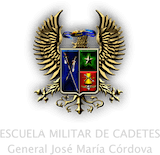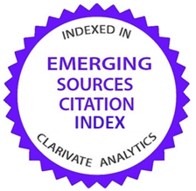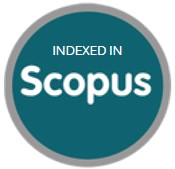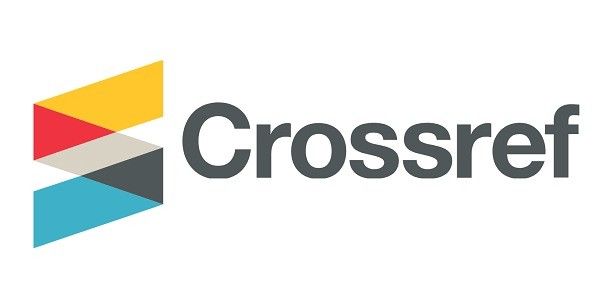Influencia de los estilos de liderazgo en el comportamiento innovador de oficiales del Ejército peruano
DOI:
https://doi.org/10.21830/19006586.865Palabras clave:
innovación, formación militar, liderazgo, liderazgo transaccional, liderazgo transformacionalResumen
Esta investigación replica el estudio de la influencia de los estilos de liderazgo en el comportamiento innovador de cadetes peruanos de Norena-Chavez et al. (2021), esta vez con oficiales de la Escuela Superior de Guerra del Ejército del Perú. Se empleó una muestra aleatoria de 103 oficiales de mandos medios. Los datos se evaluaron mediante el modelamiento de ecuaciones estructurales utilizando mínimos cuadrados parciales (PLS-SEM). Se encontró una influencia estadísticamente significativa de los estilos de liderazgo estudiados sobre el comportamiento innovador de los oficiales, aunque con una mayor influencia mostrada por el estilo de liderazgo transformacional respecto al liderazgo transaccional. Esta investigación contribuye a profundizar la comprensión de la relación de los estilos de liderazgo y del comportamiento innovador en el ámbito militar.
Descargas
Referencias bibliográficas
Ali, B. J., & Anwar, G. (2021). Self-leadership skills as intangible resources for sustainable competitive advantage. Advanced Engineering Science, 46(1), 88-104. https://ssrn.com/abstract=3824663
Andriani, S., Kesumawati, N., & Kristiawan, M. (2018). The influence of the transformational leadership and work motivation on teachers performance. International Journal of Scientific & Technology Research, 7(7), 19-29. https://bit.ly/3vB9xnI
Ansari, N. Y., Siddiqui, S. H., & Farrukh, M. (2018). Effect of high performance work practices on job embeddedness and employee innovative behavior. International Journal of Contemporary Economics and Administrative Sciences, 8(2), 64-88. http://www.ijceas.com/index.php/ijceas/article/view/249
Atatsi, E. A., Stoffers, J., & Kil, A. (2019). Factors affecting employee performance: A systematic literature review. Journal of Advances in Management Research, 16(3). https://doi.org/10.1108/JAMR-06-2018-0052
Azim, M. T., Fan, L., Uddin, M. A., Abdul Kader Jilani, M. M., & Begum, S. (2019). Linking transformational leadership with employees’ engagement in the creative process. Management Research Review, 42(7), 837-858. https://doi.org/10.1108/MRR-08-2018-0286
Bagheri, A., Newman, A., & Eva, N. (2020). Entrepreneurial leadership of CEOs and employees’ innovative behavior in high-technology new ventures. Journal of Small Business Management, 1-23. https://doi.org/10.1080/00472778.2020.1737094
Bagheri, A., & Akbari, M. (2017). The impact of entrepreneurial leadership on nurses’ innovation behavior. Journal of Nursing Scholarship, 50(1), 28-35. https://doi.org/10.1111/jnu.12354
Bani-Melhem, S., Zeffane, R., & Albaity, M. (2018). Determinants of employees' innovative behaviour. International Journal of Contemporary Hospitality Management, 30(3), 1601-1620. https://doi.org/10.1108/IJCHM-02-2017-0079
Bass, B. M. (1990). From transactional to transformational leadership: Learning to share the vision. Organizational Dynamics, 18(3), 19-31. https://doi.org/10.1016/0090-2616(90)90061-S
Bass, B. M. (1985). Leadership and performance beyond expectations. Free Press.
Battistelli, A., Odoardi, C., Vandenberghe, C., Di Napoli, G., & Piccione, L. (2019). Information sharing and innovative work behavior: The role of work‐based learning, challenging tasks, and organizational commitment. Human Resource Development Quarterly, 30(3), 361-381. https://doi.org/10.1002/hrdq.21344
Bednall, T. C., Rafferty, A., Shipton, H., Sanders, K., & Jackson, C. (2018). Innovative behaviour: How much transformational leadership do you need? British Journal of Management, 29(4), 796-816. https://doi.org/10.1111/1467-8551.12275
Buil, I., Martínez, E., & Matute, J. (2019). Transformational leadership and employee performance: The role of identification, engagement and proactive personality. International Journal of Hospitality Management, 77, 64-75. https://doi.org/10.1016/j.ijhm.2018.06.014
Bunce, D., & West, M. (1994). Changing work environments: Innovative coping responses to occupational stress. Work & Stress, 8(4), 319-331. https://doi.org/10.1080/02678379408256539
Burns, J. M. (1978). Leadership. Harper & Row.
Cai, W., Lysova, E. I., Khapova, S. N., & Bossink, B. A. (2018). Does entrepreneurial leadership foster creativity among employees and teams? The mediating role of creative efficacy beliefs. Journal of Business and Psychology, 34(2), 203-217. https://doi.org/10.1007/s10869-018-9536-y
Canet-Giner, T., Redondo-Cano, A., Saorín-Iborra, C., & Escribá-Carda, N. (2020). Impact of the perception of performance appraisal practices on individual innovative behavior. European Journal of Management and Business Economics, 29(3), 277-296. https://doi.org/10.1108/EJMBE-01-2019-0018
Carmines, E. G., & Zeller, R. A. (1979). Reliability and validity assessment. Sage.
Chatchawan, R., Trichandhara, K., & Rinthaisong, I. (2017). Factors affecting innovative work behavior of employees in local administrative organizations in the South of Thailand. International Journal of Social Sciences and Management, 4(3), 154-157. https://doi.org/10.3126/ijssm.v4i3.17755
Chen, Y., Liu, B., Zhang, L., & Qian, S. (2018). Can leader “humility” spark employee “proactivity”? The mediating role of psychological empowerment. Leadership & Organization Development Journal, 39(3), 326-339. https://doi.org/10.1108/lodj-10-2017-0307
Chin, W. (1998). The partial least square approach to structural equation modelling. En G. Marcoulides (Ed.), Modern methods for business research (pp. 295-336). Lawrence Erlbaum.
Choi, S. B., Kim, K., Ullah, S. E., & Kang, S. W. (2016). How transformational leadership facilitates innovative behavior of Korean workers. Personnel Review, 45(3), 459-479. https://doi.org/10.1108/PR-03-2014-0058
Cohen, J. (1998). Statically power analysis for the behavioral sciences. Laurence Erlbaum Associates.
Cronbach, L. J. (1951). Coefficient alpha and the internal structure of tests. Psychometrika, 16, 297-334. https://doi.org/10.1007/BF02310555
Curzi, Y., Fabbri, T., Scapolan, A. C., & Boscolo, S. (2019). Performance appraisal and innovative behavior in the digital era. Frontiers in Psychology, 10, 1659. https://doi.org/10.3389/fpsyg.2019.01659
Dedahanov, A. T., Bozorov, F., & Sung, S. (2019). Paternalistic leadership and innovative behavior: Psychological empowerment as a mediator. Sustainability, 11(6), 1-14. https://doi.org/10.3390/su11061770
Ding, H., Lin, X., & Su, W. (2020). Employee strengths use and innovative behavior: A moderated mediation model. Chinese Management Studies, 15(2), 350-362. https://doi.org/10.1108/cms-05-2019-0191
Farrukh, M., Ansari, N. Y., Raza, A., Meng, F., & Wang, H. (2021). High-performance work practices do much, but HERO does more: An empirical investigation of employees’ innovative behavior from the hospitality industry. European Journal of Innovation Management. https://doi.org/10.1108/EJIM-11-2020-0448
Fornell, C., & Larcker, D. F. (1981). Evaluating structural equation models with unobservable variables and measurement error. Journal of Marketing Research, 18(1), 39-50. https://doi.org/10.1177/002224378101800313
Grunberg, N., Barry, E., Callahan, C., Kleber, H., McManigle, J., & Schoomaker, E. (2018). A conceptual framework for leader and leadership education and development. International Journal of Leadership in Education, 22(5), 644-650. https://doi.org/10.1080/13603124.2018.1492026
Günzel-Jensen, F., Hansen, J., Jakobsen, M., & Wulff, J. (2018). A two-pronged approach? Combined leadership styles and innovative behavior. International Journal of Public Administration, 41(12), 957-970. https://doi.org/10.1080/01900692.2017.1303711
Hair, J. F., Hult, G. T., Ringle, C., & Sarstedt, M. (2014). A primer on partial least squares structural equation modeling (PLS-SEM). Sage.
Hair, J. F., Risher, J. J., Sarstedt, M., & Ringle, C. M. (2019). When to use and how to report the results of PLS-SEM. European Business Review, 31(1) 2-34. https://doi.org/10.1108/EBR-11-2018-0203
Hakimian, F., Farid, H., Ismail, M. N., & Nair, P. K. (2016). Importance of commitment in encouraging employees’ innovative behaviour. Asia-Pacific Journal of Business Administration, 8(1), 70-83. http://doi.org/10.1108/apjba-06-2015-0054
Henseler, J., Ringle, C. M., & Sinkovics, R. R. (2009). The use of partial least squares path modeling in international marketing. In New Challenges to International Marketing. Emerald Group Publishing Limited.
Jackson, N. C., & Dunn-Jensen, L. M. (2021). Leadership succession planning for today’s digital transformation economy: Key factors to build for competency and innovation. Business Horizons, 64(2), 273-284. https://doi.org/10.1016/j.bushor.2020.11.008
Janssen, O. (2000). Job demands, perceptions of effort‐reward fairness and innovative work behaviour. Journal of Occupational and Organizational Psychology, 73(3), 287-302. https://doi.org/10.1348/096317900167038
Janssen, O., Van de Vliert, E., & West, M. (2004). The bright and dark sides of individual and group innovation: A special issue introduction. Journal of Organizational Behavior, 25(2), 129-145. https://doi.org/10.1002/job.242
Jöreskog, K. G. (1971). Simultaneous factor analysis in several populations. Psychometrika, 36(4), 409-426. https://doi.org/10.1007/BF02291366
Jung, D. I., & Avolio, B. J. (1999). Effects of leadership style and followers cultural orientation on performance in group and individual task conditions. Academy of Management Journal, 42(2), 208-218. https://doi.org/10.5465/257093
Jung, D. I., Chow, C., & Wu, A. (2003). The role of transformational leadership in enhancing organizational innovation: Hypotheses and some preliminary findings. Leadership Quarterly, 14(4-5), 525-544. https://doi.org/10.1016/s1048-9843(03)00050-x
Kline, R. B. (2005). Principies and practice of structural equation modeling (2nd ed.). Guilford.
Liao, S. H., Chen, C. C., & Hu, D. C. (2018). The role of knowledge sharing and LMX to enhance employee creativity in theme park work team: A case study of Taiwan. International Journal of Contemporary Hospitality Management, 30(5), 2343-2359. https://doi.org/10.1108/IJCHM-09-2016-0522
Li, H., Sajjad, N., Wang, Q., Muhammad, A., Khaqan, Z., & Amina, S. (2019). Influence of transformational leadership on employees’ innovative work behavior in sustainable organizations: Test of mediation and moderation processes. Sustainability, 11(6), 1594. https://doi.org/10.3390/su11061594
Mahalanobis, P. C. (1930). On tests and measures of group divergence. Journal of the Asiatic Society of Bengal, 26, 541-588. http://hdl.handle.net/10263/1639
Mardia, K. V. (1970). Measures of multivariate skewness and kurtosis with applications. Biometrika, 57, 519-530. https://doi.org/10.1093/biomet/57.3.519
Mardia, K. V. (1974). Applications of some measures of multivariate skewness and kurtosis in testing normality and robustness studies. Sankhyā: The Indian Journal of Statistics (Series B), 36(2), 115-128. https://www.jstor.org/stable/25051892
Miao, Q., Newman, A., Schwarz, G., & Cooper, B. (2018). How leadership and public service motivation enhance innovative behavior. Public Administration Review, 78(1), 71-81. https://doi.org/10.1111/puar.12839
Newman, A., Herman, H. M., Schwarz, G., & Nielsen, I. (2018). The effects of employees’ creative self-efficacy on innovative behavior: The role of entrepreneurial leadership. Journal of Business Research, 89, 1-9. https://doi.org/10.1016/j.jbusres.2018.04.001
Norena-Chavez, D., Céliz Kuong, J. O., & Guevara, R. (2021). Influencia de los estilos de liderazgo en el comportamiento innovador de cadetes peruanos. Revista Científica General José María Córdova, 19(33), 29-50. https://doi.org/10.21830/19006586.732
Norena-Chavez, D., & Thalassinos, E. I. (2021). The mediation effect of entrepreneurial self-efficacy in the relationship between entrepreneurial passion and leadership styles. Academy of Strategic Management Journal, 20(2), 1-9. https://bit.ly/3sKlZ2B
Pieterse, A. N., Van Knippenberg, D., Schippers, M., & Stam, D. (2010). Transformational and transactional leadership and innovative behavior: The moderating role of psychological empowerment. Journal of Organizational Behavior, 31(4), 609-623. https://doi.org/10.1002/job.650
Podsakoff, P. M., & Podsakoff, N. P. (2019). Experimental designs in management and leadership research: Strengths, limitations, and recommendations for improving publishability. The Leadership Quarterly, 30(1), 11-33. https://doi.org/10.1016/j.leaqua.2018.11.002
Priadana, S., Sunarsi, D., Wahyitno, A., Sudarso, A., Mogi, A., Agustin, F., Irawati, L., Supriyadi, Kahpi, H., Wandi, D., & Purwanto, A. (2021). The effect of strategic leadership on competitive strategy and business performance: Evidence from Indonesian SME’s. Annals of the Romanian Society for Cell Biology, 25(4), 4908-4918. https://bit.ly/35VbS25
Purwanto, A., Bernarto, I., Asbari, M., Wijayanti, L. M., & Hyun, C. C. (2020). Effect of transformational and transactional leadership style on public health centre performance. Journal of Research in Business, Economics, and Education, 2(1), 304-314. https://bit.ly/3KgkVcE
Ringle, C. M., Wende, S., & Becker, J.-M. (2015). SmartPLS 3 [software]. SmartPLS.
Scott, S. G., & Bruce, R. A. (1994). Determinants of innovative behavior: A path model of individual innovation in the workplace. Academy of Management Journal, 37, 580-607. https://doi.org/10.5465/256701
Sengphet, P., Hui, L., & Phong, L. (2019). The pathway to improve innovation capacity for Lao firms: the roles of transformational leadership and psychological resources of employees. Journal of Business Administrative Studies, 5(2), 224-239. https://doi.org/10.20469/ijbas.5.10004-4
Shalley, C. E. (1995). Effects of coaction, expected evaluation, and goal setting on creativity and productivity. Academy of Management Journal, 38(2), 483-503. https://doi.org/10.5465/256689
Wang, Z., Cui, T., & Cai, S. (2021). How and when team reflexivity influences employee innovative behavior. Journal of Managerial Psychology, 37(1). https://doi.org/10.1108/JMP-11-2020-0590
Wang, Z., Sun, C., & Cai, S. (2020). How exploitative leadership influences employee innovative behavior: the mediating role of relational attachment and moderating role of high-performance work systems. Leadership & Organization Development Journal, 42(2), 233-248. https://doi.org/10.1108/LODJ-05-2020-0203
Zheng, J., Wu, G., Xie, H., & Li, H. (2019). Leadership, organizational culture, and innovative behavior in construction projects: The perspective of behavior-value congruence. International Journal of Managing Projects in Business, 12(4), 888-918. https://doi.org/10.1108/IJMPB-04-2018-0068
Zhou, F., & Wu, Y. J. (2018). How humble leadership fosters employee innovation behavior. Leadership & Organization Development Journal, 39(3), 375-387. https://doi.org/10.1108/lodj-07-2017-0181
Descargas
Publicado
Cómo citar
Número
Sección
Licencia
Derechos de autor 2022 Revista Científica General José María Córdova

Esta obra está bajo una licencia internacional Creative Commons Atribución-NoComercial-SinDerivadas 4.0.
| Estadísticas de artículo | |
|---|---|
| Vistas de resúmenes | |
| Vistas de PDF | |
| Descargas de PDF | |
| Vistas de HTML | |
| Otras vistas | |

